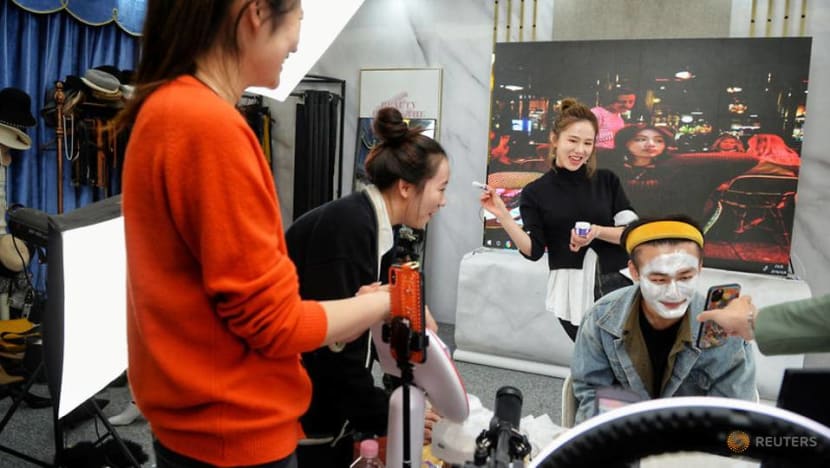commentary Commentary
Commentary: Retail in China has exploded with online sales agents. Now Walmart wants in
Walmart’s bid for TikTok belies the deeper changes in retail and e-commerce already underway in China and almost certain to be the future for many other countries, say Howard Yu, Mark Greeven and Jialu Shan.

Composite of Chinese social media influencers. (Photos: Screengrab/YouTube, AFP, Reuters)
SINGAPORE: Kevin Mayer has stepped down as chief executive of TikTok just months into the job.
The CEO left after Trump said he’d shut down the video app unless it sold its US business to an American firm in 90 days. Oracle, Microsoft and Twitter have been trying to acquire it.
Now Walmart is too.
Walmart said Thursday (Aug 27) that it’s teaming up with Microsoft in a bid for TikTok. At first, this seems unusual.
The only obvious fit is that TikTok could be a huge boost for Walmart’s e-commerce business. There might be some potential to cross-sell ads. But in fact, there’s much more to it.
LISTEN: Phishing scams and the sketchy tricks of the online crime trade
READ: Commentary: TikTok and Microsoft and how government agendas are reshaping Big Tech
THE FUTURE OF E-COMMERCE IS IN LIVE-STREAMING
Walmart understands the future of e-commerce is in live-streaming. For the last few years, the company has been stepping up its digital activities.
In the US, it’s offered curbside pick-ups so people can shop at a safe distance. In China, Walmart is the only foreign supermarket in the country’s massive e-commerce arena.
It made significant investments in JD.com, China’s second largest e-commerce platform. It then partnered with JD in 2018 to invest US$500 million in grocery delivery company Dada-JD-Daojia.

While it was making US$10 billion in China, Walmart also saw first-hand what had happened there during the pandemic. Both Alibaba and JD.com saw a revenue surge of 34 per cent each in the April to June quarter.
Now the company is bringing what it learned from China back to the US. And TikTok is the vehicle.
China is reopening after a long quarantine. But consumer behaviors are utterly changed: People still harbour fear over a resurgent virus.
It is compulsory to wear a mask. Your body temperature is measured when one enters a mall or supermarket.
READ: Commentary: What China’s economy needs most is a good old big investment drive
LISTEN: Recovery, restructuring and possibly rebound? The outlook for the Singapore economy
All these things will decrease foot traffic for at least another quarter. But not every traditional retailer has felt the blow. Live-streaming has proven to be the saving grace for some.
CHINA LEADS THE WAY IN NEW RETAIL FUTURE
Consider a well-known case in China, Peacebird. It’s a billion-dollar fashion retailer with seven brands and 4,600 brick-and-mortar stores.
The company achieved a revenue of more than 10 million yuan (US$1.41 million) during the first three weeks of the Chinese New Year, the same period when the coronavirus outbreak ravaged Wuhan and triggered its lockdown.
By the second quarter of the year, the company had already seen a 30 per cent online revenue year-on-year increase.

Peacebird chairman Zhang Jiangping responded by going all in on e-commerce. He drove the transition. He notified all sales agents and authorised them to post content on social media channels while representing the company.
Then a milestone came on Jan 28. Three days into the Chinese New Year, retail director Andre Gao hosted Peacebird’s first live-stream session.
His session, inspired many at the company. Over 100,000 people joined it. Thousands of in-store sales managers were motivated to become online sales agents.
Live-streaming is big business. Dong Mingzhu, CEO and chairwoman of Gree, the electronics and home appliances Chinese giant, tried it this year.
READ: Commentary: The new wave of Chinese tech champions you never heard of but should know
READ: Commentary: Who will get the COVID-19 vaccine Chinese companies are developing?
Her live-stream session on Jun 1 sold 6.54 billion yuan (US$915 million) worth of products – the equivalent to one month’s revenue for Gree.
This infomercial craze, turbocharged by live-streaming, has been underway in China for some time. Just last year, during Single’s Day on Nov 11, 2019, social media influencer Mr Lipstick generated US$145 million in sales on that one day alone. Not bad for a guy specialising in cosmetics.
But the coronavirus has seen the wholesale migration of Chinese retail to the digital realm. Department store Intime launched live commerce when the virus closed its 65 stores.
Sales agents, working from home, interacted with customers via Taobao Live, the live-streaming platform run by Alibaba. They reached as many new clients in a three-hour period as they would in six months inside an actual store.
Could this be the future Bloomberg dubs “the next frontier of shopping”?
A STORY OF HOW NIKE FOUND NEW SALES
Much has been said about how this pandemic has ravaged shops but in China, the coronavirus has also breathed new life into retailers.

In April, Luo Yonghao, founder of Smartisan and one of “China’s first-generation internet celebrities,” went live on Douyin. He successfully gathered 48 million viewers and generated over 110 million yuan (about US$15.5 million) in revenue during his three-hour live-stream.
Western brands can benefit from new retail formats in China too. Sportswear giant Nike is a great example. It posted 5 per cent revenue growth in its third quarter, even though over 5,000 of its Chinese stores were forced to close in January.
READ: Commentary: Is COVID-19 the final straw that breaks the Orchard Road camel’s back?
READ: Commentary: Will COVID-19 spell the end of strata malls?
Nike’s online sales in China surged by more than 30 per cent with the help of live-streaming on Tmall.
The brand also launched the Air Max March Party in April, which was broadcast online on Tmall. It attracted 2.78 million viewers and 24 million likes. This translated into over 5 million yuan’s worth of sales in only three-and-a half hours.
Nike’s sales revenue for the Greater China region only dipped by 5 per cent in the first quarter, a figure even Apple couldn’t match.
SO WALMART IS SITTING UP
Did Walmart take notice? It seems so.
After all, Douyin, the Chinese version of TikTok, is the second-largest player in China. It accounts for 13 per cent of the live streaming e-commerce market share, just after Alibaba’s Taobao Live.

What happened in China may hold the key to how Walmart could leapfrog Amazon in the US among consumers aged 16 to 24.
Don’t forget TikTok has about 100 million monthly active users in the US, half of whom use it daily.
It doesn’t take long to imagine tens of thousands of Tiktokers starting to live-stream products in the same way millennials have endorsed brands on Instagram.
It doesn’t take long to imagine Walmart could step up its logistic services and turn its stores into fulfillment centres even after the coronavirus pandemic. People could watch TikTok, click, drive to Walmart, and do a curbside pickup.
Amazon should sit up.
Howard Yu is LEGO Professor of Management and Innovation as well as the director of IMD's signature programme, the Advanced Management Programme. Mark Greeven is Professor of Innovation and Strategy at IMD. Jialu Shan is an economist and Research Fellow at Global Center for Digital Business Transformation.
This commentary is part of a fortnightly CNA-IMD Business School series on leadership and business issues.


















